Recently we often hear the word ikumen in the mass media. A recently coined term that refers to men who actively participate in raising their children, it is a play on words taken from ikuji, Japanese for "child-raising" and "men." This is partly due to the growing attention given to fathers' involvement in child-raising and housework while Japanese society has been coping with the trend toward fewer children and increasing dual-income households. Social frameworks are now being developed to encourage fathers to take part in child care: one such initiative is the enactment of the revised Act on Child Care and Family Care Leave i .
In this report, therefore, we explain the actual conditions of fathers' involvement in child-rearing/housework and their views on raising a child, based on the results of the online surveys conducted in 2005 and 2009 by Benesse Institute for Child Sciences and Parenting. Participants in the surveys were fathers of infants between 0 and 6 (pre-school ages) living in metropolitan areas.
This report is intended to provide our readers with some indication of how young fathers view the gap between what they consider to be the ideal father and their reality, which may provide an occasion for further thinking issues in Japanese society.
(1) Fathers' involvement in child-rearing and housework: actual conditions and what they really want to do
First, this figure shows the actual degree of fathers' involvement in child-rearing and housework by comparing survey results in 2005 and 2009.
Figure 1: Actual conditions of fathers' participation in child rearing and household matters (comparison of 2005 and 2009 survey results)
How often do you...?
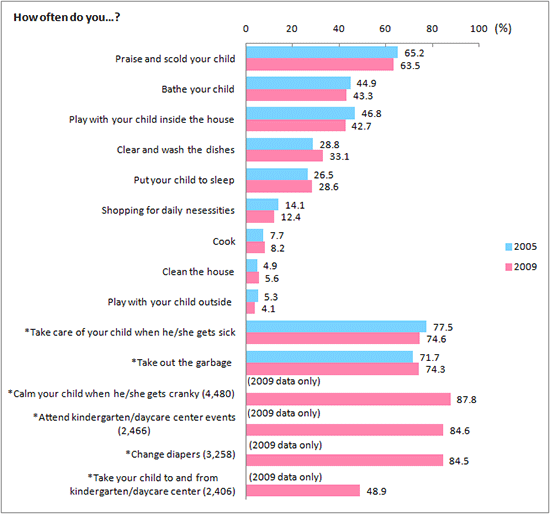
Enlarge
Note 1) Above figures are the total of responses "almost every day" and "3 to 5 days per week."
Note 2) Figures with * are the total responses of "always" and "sometimes."
Note 3) For the survey items only used in 2009, the response "not applicable" was added: therefore, participants who chose this response were excluded from aggregation parameters.
Note 4) Figures in brackets refer to sample data.
- The result shows little change in fathers' participation in child rearing / household matters during the past four years
There is no material change in the response of the 2005 and 2009 surveys, which implies that the degree of fathers' involvement has not much increased. We can also see that fathers, due to time constraints after coming back home from work, tend to choose such daily child-rearing tasks as giving the child a bath and playing indoors with the child, rather than shopping for daily necessities, preparing a meal, or cleaning the house. - On a daily basis, fathers can only take part in quick, isolated tasks of child-rearing
Fathers tend to participate in quick, isolated child-rearing tasks, such as calming a cranky child, attending events at the kindergarten/daycare center, changing diapers, and scolding or praising the child. In contrast, there is lower frequency of participation for such tasks as playing outside with the child and putting the child to sleep, which indicates that most fathers come home late and cannot spend time for time-consuming child-rearing tasks.
Next, we asked fathers whether they wanted to be more involved in child-rearing/housework, and which tasks, in particular. The following graph shows their responses.
Figure 2: Do you want to be more involved in child-rearing/housework?

Figure 3: What child-rearing tasks would you like to spend more time on? (2009)
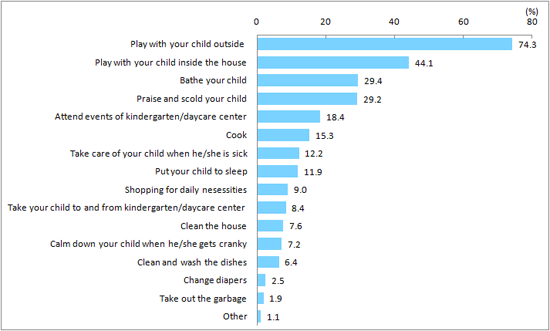
Enlarge
Note 1) "Yes" to "Do you want to be more involved in child rearing / household matters?"
Note 2) Multiple answers allowed (up to three).
Note 3) Data sample: 2,479 fathers
- 54.2% of fathers want to be more involved in child rearing/household matters (+6.3% in 2009 vs. 2005)
The survey indicates that fathers' motivation to take part in child-rearing / housework has increased in the past four years. Perhaps the popularity of the term ikumen has contributed to this trend. - More than 70% of fathers want to spend more time playing outdoors with their child
Fathers who answered they wanted to spend more time on child-rearing/housework identified playing outdoors with their child as the child-rearing task they most wanted to do. Fewer fathers wished to do more housework. It seems that fathers simply wish to have more contact with their child.
(2) Fathers' expectations for the future of their child
Next, we looked into the fathers' perspective on child-rearing and their expectations of their child. First, we asked fathers what kind of a person they wanted their child to be in the future. Figure 4 shows their responses.
Figure 4: What kind of a person do you want your child to be? (2005 vs. 2009)
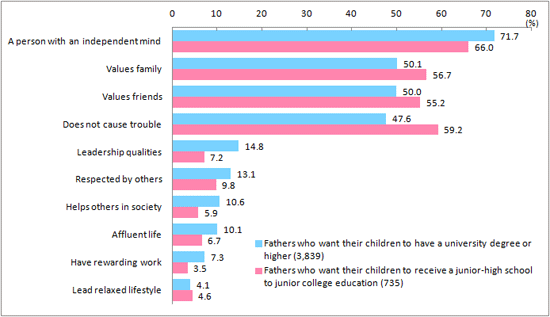
Enlarge
Note 1) Multiple answers were allowed (up to three).
Note 2) The answer "a person with an independent mind" was used in 2009 only.
Note 3) The answer "Principles character" was used in 2005 only.
- For fathers, human relationships are the most important: the top ranked answer is "A person with an independent mind" (70.8%)
Based on the four most popular responses, fathers most wanted their child to be "A person with an independent mind," "Values family," "Values friends" and "Does not cause trouble." Fathers' emphasis on human relationships has not changed since 2005.
The above results were then classified according to fathers' expectations of their child's education.
Figure 5: What kind of a person fathers want their children to be? (by educational expectations)
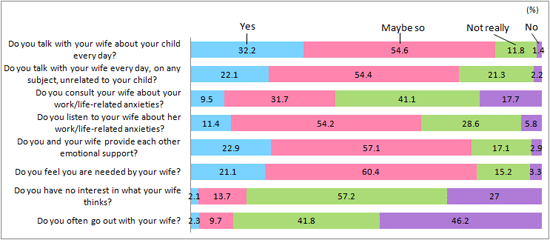 Note 1) Multiple answers allowed (up to three).
Note 1) Multiple answers allowed (up to three).Note 2) Figures in brackets refer to sample data.
- Fathers who want their children to have a university degree or higher choose "a person with leadership" and "a person with an independent mind"
The result indicates that the majority of fathers who want their children to have a university degree or higher expect the child to be "a person with an independent mind" and is able to take on the role of leadership, obtain respect from others, and contribute to society". - Fathers who want their children to receive a junior-high school to junior college education choose "a person who does not cause others trouble", "a person who cares about family" and "a person who values friends"
The majority of fathers who want their children to receive at least a junior high school to junior college education, too, chose the answer "a person with an independent mind"; but they also expect their child to be a person who can care about other people and build good relationships.
(3) Number of children fathers want to have and their feelings regarding the affordability of having another child
Next, we asked fathers whether they want to have another child. Their responses were categorized according to the present number of children and their feelings regarding the affordability of having another child.
Figure 6: Do you want to have one more child? (all fathers)

Figure 7: Do you want to have another child? (by present number of children)

Note) Figures in brackets refer to sample data.
Figure 8: Do you want to have another child? (fathers with one child, by affordability of having another child)
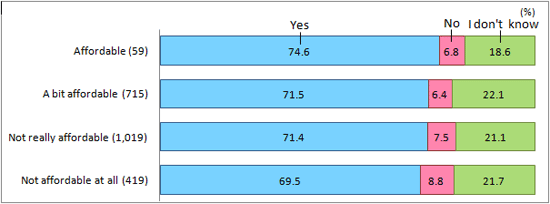
Note 1) Respondents are those who answered they have one child.
Note 2) Figures in brackets refer to sample data.
Figure 9: Do you want to have one more child? (fathers with at least two children or more, by affordability of having another child)
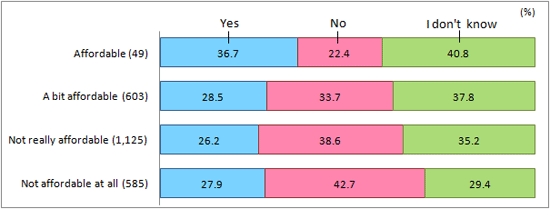
Note 1) Respondents are those who answered they have at least two children or more.
Note 2) Figures in brackets refer to sample data.
- Over 70% of fathers with one child want another child
Overall about 50% of fathers responded that they wanted to have another child. However, when comparing fathers with one child and those with at least two children, the latter group showed less eagerness, with fewer than 30% of them answering positively. - Fathers' wish to have a second child is not influenced by feelings of affordability
About 70% of fathers with one child who had marked 'unaffordable' still want to have another child. This indicates their eagerness to have a second child despite economic pressure on the household. - Fathers retain a more cautious attitude to having a third child, depending on feelings of affordability
About 30% of fathers with two children answered positively to having another child. About 20% of fathers who felt another child was affordable still responded negatively to having a third child, while more than 40% of fathers who felt another child was unaffordable also gave negative responses. This indicates that affordability influences their attitude towards having a third child.
(4) The strength of bond between husband and wife in child-rearing
Lastly, we will show survey results concerning conversation between husband and wife, and the trust between the couple while child-rearing.
Figure 10: Relationship with wife

Figure 11: Going out with wife
Do you often go out with your wife?
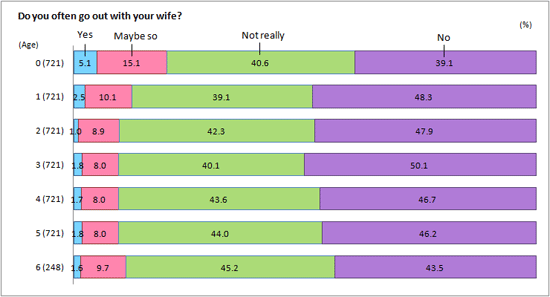
Note) Figures in brackets refer to sample data.
- More than 80% of fathers say they talk with their wife about their child every day
More than 80% of fathers responded that, no matter how busy they are with work, they talk to their wife about their children every day; however, only 40% answered that they discuss anxieties about work/life. - Only 12% of fathers answer "Yes/Maybe so" to the question of going out with their wife two alone together
Realistically speaking, it is not easy for couples to go out together when their child is an infant and requires constant care; however, the frequency of going out as a couple still remains low even when the age of respondents' child is higher. In Japanese culture where the trend toward the nuclear family is obvious and the option of baby-sitting is not a familiar custom, such low figures are quite understandable; nevertheless, going out together may be important to strengthen the bond between husband and wife.
Conclusion
Young fathers are working hard to become an ikumen or men who actively participate in child-raising, despite social, cultural and economic constraints. We should value their efforts and try, in the long run, to improve the environment surrounding them so that ikumen is achievable.
Fathers who try to find time for child-rearing even though they come home exhausted late at night; who have high expectations for the future of their child; who want to have two children even though they feel it is not affordable... all of them, having a passion to be a good father, are candidates for ikumen.
However, in reality, on a daily basis, they cannot spend much time raising children or on housework. All they can do is to do a task for or with their child that does not take up too much time. Childcare leave is now legally available but most of them cannot take advantage of it.
It is hoped that in the future fathers will be able to spend more time with their child on activities in the home as well as in the community. Long-term persistent and proactive efforts will be called for in our society, if we want to create the conditions necessary for a better work-life balance for fathers.
i Act on the Welfare of Workers Who Take Care of Children or Other Family Members Including Child Care and Family Care Leave
Reference source: The second survey report on fathers of infants (2010)
http://www.benesse.co.jp/jisedaiken/research/research_09.html#link4
The original article (Japanese) is available on the site.
http://benesse.jp/blog/20110609/p1.html














